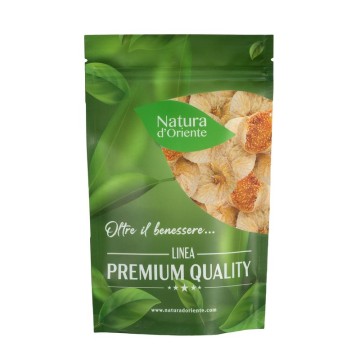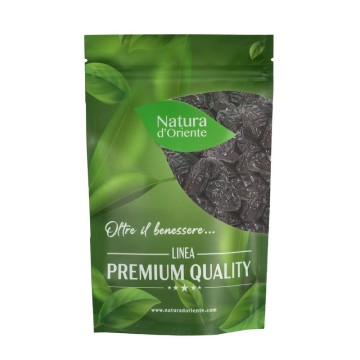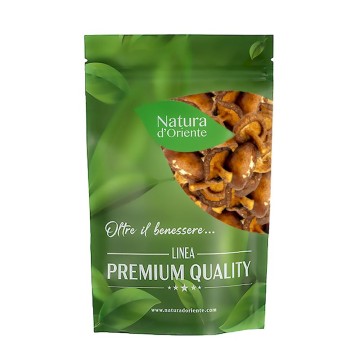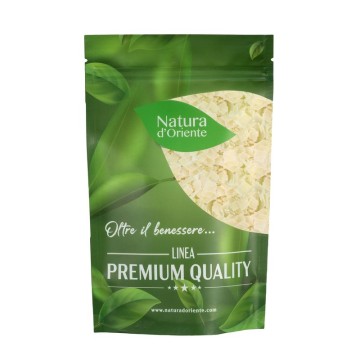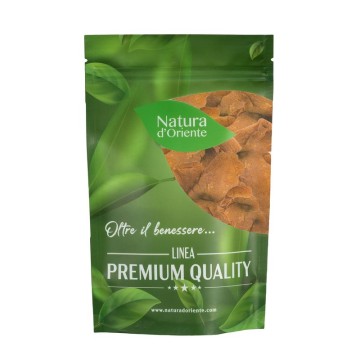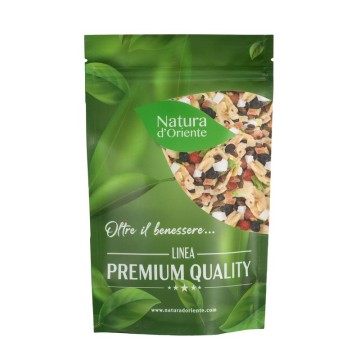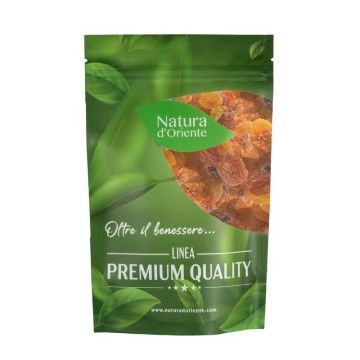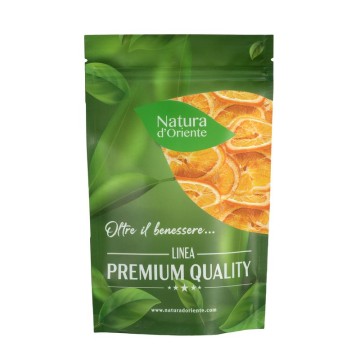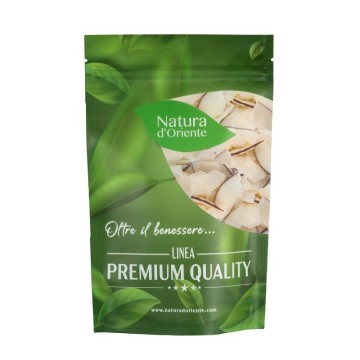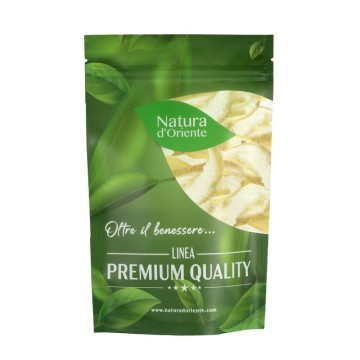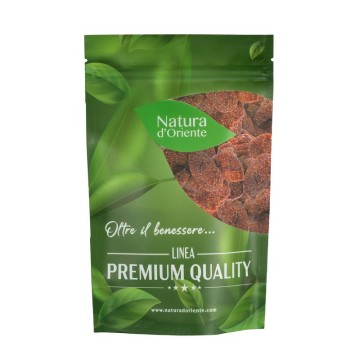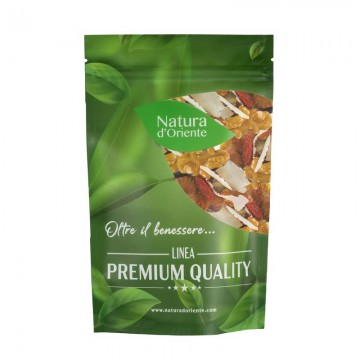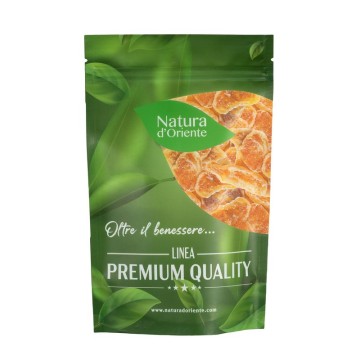Dried Blackberries
Blackberries offer many health benefits. They are berries rich in minerals such as manganese, and vitamins such as C and K. They contain numerous fibers and can increase our health thanks to antioxidants.
Dried Blackberries: properties and benefits.
Even in their dried version, these delicious dried blackberries can give benefits for the well-being of our body, thanks to their high content of beneficial nutrients.
For example, we know that the intense color of blackberries can be attributed to their high anthocyanin content. It is a class of antioxidants that fights oxidative damage caused by free radicals (harmful molecules released in part by toxins), and helps the body to promote well-being conditions against heart disease.
In addition to being a satisfying snack, dehydrated blackberries are rich in soluble and insoluble fiber. Nutritional research has long suggested that eating foods rich in soluble fiber can help lower cholesterol.
The soluble fiber, in fact, during digestion partially traps the cholesterol present in the intestine and drags it towards the expulsion from the body. Furthermore, by also engaging bile acids, it pushes the liver to produce more by using more cholesterol - which is lowered further.
The insoluble fiber content of dried blackberries, on the other hand, supports the digestive system and promotes proper intestinal transit - therefore recommended for those suffering from constipation. It makes you feel full longer after eating, and nourishes healthy gut bacteria.
Blackberries are also an excellent source of vitamins A, C, and K, and are known as berries protect the immune system for this reason.
Vitamin C, abundant in blackberries, is an integral part of the formation of collagen in bones, connective tissue and blood vessels. Vitamin C can also help regenerate the skin and reduce free radicals in the body, absorb iron and counteract cold symptoms.
Vitamin C acts as an antioxidant, therefore, while vitamin K, of which dehydrated blackberries are a good source, plays a role in both coagulation and bone metabolism. Vitamin K deficiency can lead to bone thinning and bone fractures, or cause bruising, so it's good to evaluate its importance in the diet.
Furthermore, blackberries contain high contents of manganese, a mineral essential for healthy bone development and a strong immune system. It also helps the body to properly metabolize carbohydrates, amino acids and cholesterol.
Manganese also plays a role in collagen formation, like vitamin C, via the enzyme prolidase - an enhanced anti-aging action, therefore, between the two substances.
Eating berries such as blackberries, dehydrated or not, thanks to anthocyanins can maintain the functions of our brain, helping against aging due to free radicals and inflammation, which with their harmful action can affect the areas over time that govern memory.
For their anti-aging properties, in addition to the presence of vitamins and mineral salts, blackberries are indicated as nourishment for athletes.
Origins and History of cultivation
 The blackberry plant, Rubus fruticosus and it is difficult to trace its exact origin, even if many studies think it comes from Asia, while others focus on America or Europe.
The blackberry plant, Rubus fruticosus and it is difficult to trace its exact origin, even if many studies think it comes from Asia, while others focus on America or Europe.
In any case, blackberries were consumed by man already during the Iron Age, and in the classical period the Greeks and Romans used them in medicine, just as the Native Americans had introduced them in their diet, and for coloring animal skins.
Today there are more than 40 species of the plant, and if once blackberries were completely wild, since the nineteenth century they have been cultivated, mostly in America.
There are many crossings to date, even an attempt to develop plants without the thorn in 1921.
Blackberry has been used medically to treat intestinal problems and fever for many centuries. The root, bark and leaf of the plant were often used in medicinal applications. They were boiled in water and given as a medicine for whooping cough. In the eighteenth century it was thought that blackberry decoctions could cure ulcers.
The culinary history of blackberries, on the other hand, involves these berries for their exquisite flavor. Blackberries have been used for centuries to make desserts, such as mo pieking or jam, or eaten plain. In the seventeenth century, they were used in England to produce wine and liqueurs, and among many populations they were used to create an indigo or purple dye.
Blackberry bushes, thanks to their thorns, were often planted around villages to provide protection against enemies and dangerous animals. Brambles provide protection for wildlife, including deer and birds.
Plant and Fruit
Rubus Fruticosus L. is a perennial, semi-deciduous, thorny and climbing plant. From the woody foliage many arched and entangling stems are born, to form the well-known groves of blackberries. They can also be quite tall - blackberry stems are erect or semi-erect canes that arch up to 7m in length.
Stems usually live a couple of years and die after fruiting. In the first year they usually do not produce flowers, in the second year lateral shoots grow, bearing the flowers and fruits.
The leaves of blackberry plants are alternate, with three or five oval leaflets, the flowers grow in clusters on the side branches with white or pink petals, and the blackberry fruit we know well comes with its berry shape.
Like that of the strawberry, the blackberry is a false fruit: it is a drupe made up of many seeds, the real fruits, and a fleshy pulp.
The fruit is acidic when not ripe, sometimes almost woody, while when ripe it becomes excellent in taste. The diameter of the berries is about 1-3 centimeters, and the color varies during ripening, from green to red to black.
The plant is now also cultivated with thornless varieties, grown in rows or hedges, and the varieties are many, widespread in Europe, Asia and America.
Nutritional values of dehydrated blackberries
Following the natural properties of other dried berries, blackberries represent an abundant source of vitamins and other micronutrients, which we can evaluate in a content of 100 grams.
This dried blackberry variety does not contain excessive calories (around 338 per 100 grams), and offers a high content of fiber (around 2.3g / 100g), protein (around 2.4g / 100g), and reduced fat (about 0.59 g / 100 g).
Blackberries contain excellent amounts of vitamin C (about 22 mg / 100 g), moderate amounts of Vitamin A (about 140 IU / 100 g), vitamin E (2.4 mg / 100 g) and Vitamin K ( about 58 µg / 100 g). There is no shortage of B vitamins - vitamin B3 (Niacin - 1.2 mg), Vitamin B1 (Thiamine - 0.1 mg) and vitamin B6 (Riboflavin).
Among the minerals available in blackberries, there are calcium (about 19 mg / 100 g), iron (about 1 mg / 100 g), potassium (about 210 mg / 100 g) and phosphorus (about 36 mg / 100 g ),
How to consume or use dehydrated blackberries
Dried blackberries are a sweet and satiating snack, which can be eaten directly or added to a mix of cereals, seeds and muesli.
A delight in the morning for breakfast also with yogurt, a smoothie or as a garnish for cakes, muffins, cupcakes, ice creams and parfaits.
Blackberries can also be used as ingredients for energy bars for athletes, and in the dried version they are very popular as a flavoring for liqueurs or for tea.
Eating a handful of dehydrated blackberries is a great option to satisfy your sweet tooth when looking for a hunger-busting snack that doesn't turn into a meal.
Dried Blackberries: side effects and contraindications
There are no serious risks associated with the consumption of dried blackberries, unless there is an intolerance or allergy to the fruit itself.
Remember, in any case, to consume blackberries and dried fruit in the correct quantities, because in high doses they can provide high amounts of sugars and calories.
People with diabetic disease should avoid excessive use, so as not to facilitate the increase in blood sugar.
Furthermore, a slight laxative effect is always possible in the high quantities of dehydrated blackberries, and for those suffering from diverticulosis it is good to be careful, for the presence of seeds that can be caught in the diverticula.
![]()

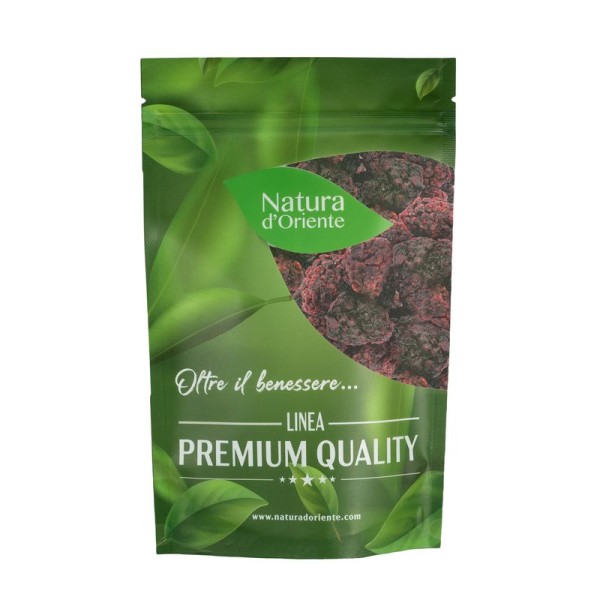









 No reward points for this product.
No reward points for this product.
 The blackberry plant, Rubus fruticosus and it is difficult to trace its exact origin, even if many studies think it comes from Asia, while others focus on America or Europe.
The blackberry plant, Rubus fruticosus and it is difficult to trace its exact origin, even if many studies think it comes from Asia, while others focus on America or Europe.

